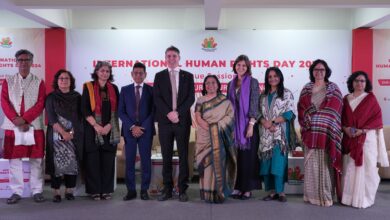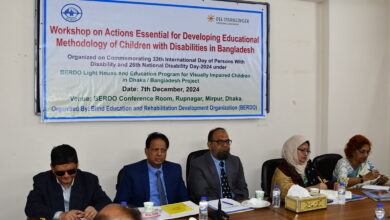Brac at 50: Celebrates golden jubilee
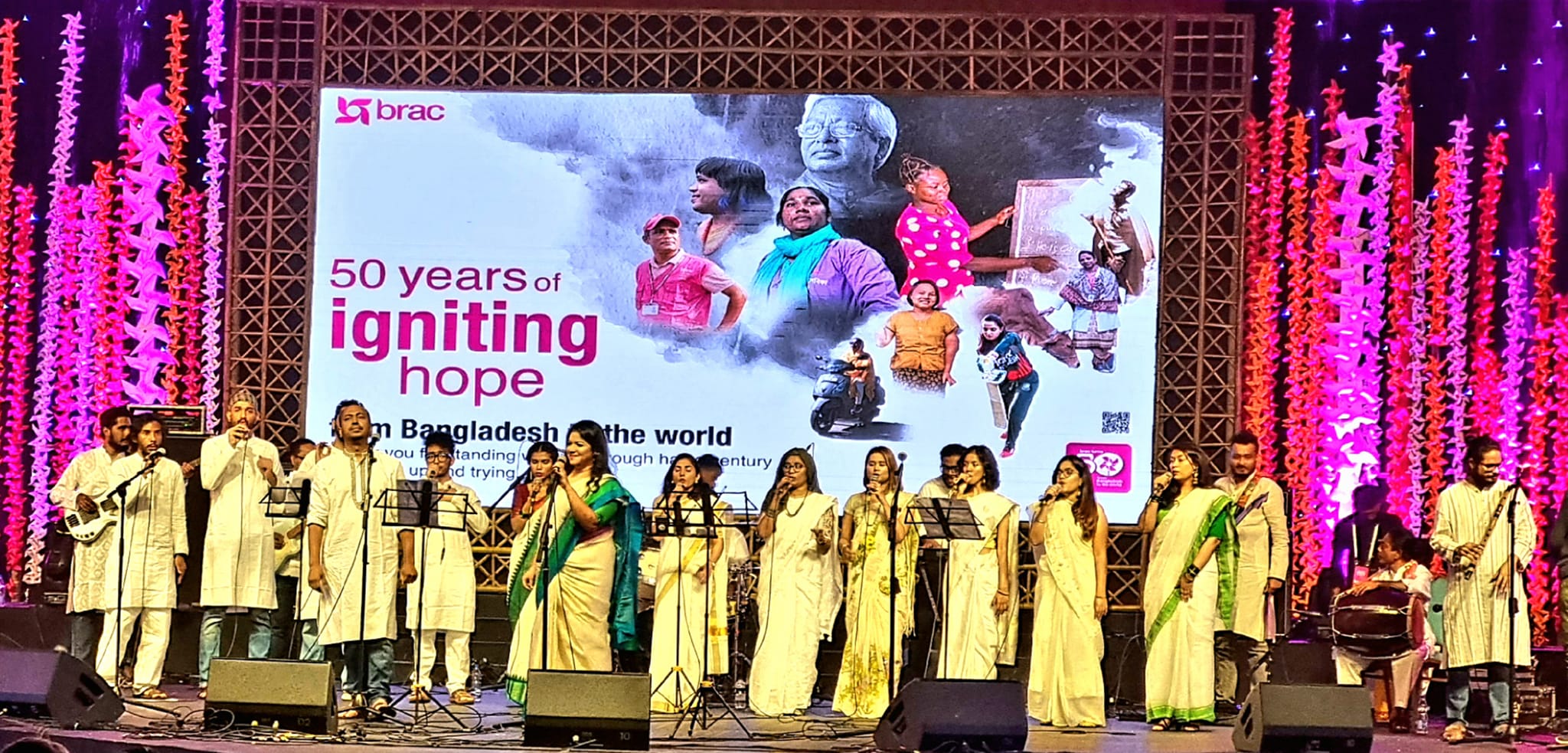
Brac, one of the world’s large’s non-governmental organizations, celebrated its 50th anniversary on Monday.
To mark the occasion, the organization pledged to accelerate the work of self-reliance of the underprivileged at home and abroad.
Brac was founded on 21 March 1972, by the late Sir Fazle Hasan Abed, as an organisation addressing the immediate needs of hapless refugees returning home to a war-torn country. Sir Abed soon realised that mere relief would be inadequate to help these people get back on their feet, and throughout the first decade Brac came up with innovative interventions – including forming cooperatives, improving agriculture, providing microfinance and training people in handicrafts – that created livelihood opportunities for people living in some of the most economically deprived areas of the country.
In the 1980s, Brac, working alongside the government, helped build the healthcare backbone of the country. It became a household name through the nationwide promotion of oral saline. It took on the responsibility of immunising half the population of the country while the government completed the other half. These two interventions played a massive role in bringing down child mortality, which in turn had a dramatic impact in controlling population growth – Bangladesh’s biggest headache in the first two decades of its existence.
In the next decade, Brac took the rate of literacy head on.
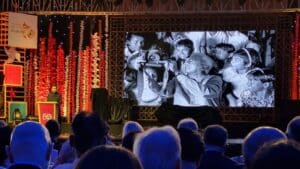
Brac designed a single room, 30-student schools with a curriculum designed to equip poor children, especially girls, with basic, writing and numeracy skills in just three years (later expanded to four).
In 1985, there were only 22 Brac schools in the country, by 2009, there were 64,000.
Many of the impressive achievements that Bangladesh flaunt today on international podiums – the drop in child and maternal mortality, 100 percent enrollment of girl children in schools, drop in poverty rate – would have effectively been impossible without the presence of Brac.
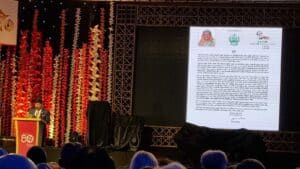
“Brac and Bangladesh essentially complement each other. There would have been no Brac without the creation of Bangladesh, and at the same time, if Brac was not involved in addressing Bangladesh’s problems then in all likelihood the country’s growth and development would have been more unequal,” says Asif Saleh, Brac’s Executive Director, adding, that Brac’s biggest contribution was probably bringing women out of their homes and into the workforce.
And secondly, it was bringing the unbanked into the whole financial system.
“If you look at even the Covid-19 response – a recovery process has started, people are getting back to things, because they are a part of a system. They are coming to us, taking money and using that money to start work. You could never imagine these things if they were not a part of this system,” he says.
Saleh had taken over as ED in 2019, only months before Sir Abed passed away in December of that year, although the leadership transition process began as early as 2012, when Saleh became the senior director strategy, communication and capacity.
It was an unusual and inspired choice on the part of Sir Abed to hand over the reins to Saleh, who, like the founder, spent the first decade of his career in the corporate world as executive director at Goldman Sachs.
But not long after taking over, Saleh found himself in deep waters, as the pandemic hit and millions of people were left fending for their survival.
“Within days, we rolled out low interest, small loans for those hardest hit by the pandemic lockdowns, realising that the government stimulus packages would take longer to roll out,” says Saleh, as we spoke on the sidelines of the Career Hub launch.
Brac’s immediate Covid-19 response was reminiscent of Brac’s work in the early years, where the organisation jumped in to fill in the gaps of the government response after a disaster, by acting swiftly, decisively and innovatively. Brac not only provided these loans, but teamed up with the government to facilitate Covid-19 testing, quarantine returnee migrants and operate the government helplines.
By the second year of the pandemic, Brac began working on building community resilience to Covid-19.
There are a staggering 26,000 NGOs in Bangladesh. What distinguishes Brac from most of them is their ability to scale to massive proportions. It is driven by Sir Abed’s dictum: ‘Small is beautiful, but large is necessary,’ which has seen the organisation become not only the second largest entity in Bangladesh, behind the government, but also spread its wings to 13 countries around the world.
“What most NGOs do is do small pilots or work in one or two districts, and then they get donor money and start a project; and then they move to another project,” says Saleh. For Brac, however, scalability is something they assess right from the stage of project design and early pilots.
“Very big thinking – that’s what Brac has always done well. So even with the Brac schools, the goal was to build 100,000 schools in Bangladesh. How much money will we need to build 100,000 schools? Then we got all the donors to come in and basically said this is what we want to do and do you want to be a part of this?” says Saleh.
The other key to Brac’s success, rather oddly for a social organisation, is their entrepreneurial spirit. Brac’s template for addressing social problems is not dissimilar to how entrepreneurs find opportunities for business. While entrepreneurs find a gap in the market for a product or a service, Brac identifies a gap in society where the needs of people are not being addressed.
“Brac has always been very entrepreneurial and risk-taking in nature. It has always taken big bets. Certain things will work and certain things won’t. But that’s the entrepreneurial nature,” says Saleh, acknowledging that for every Brac School or Aarong that worked, Brac also had to deal with failures including Brac Solar, which never managed to scale or a project to export frozen food nearly two decades back, which was a little too ahead of its time.
Given this entrepreneurial spirit, it comes as little surprise that Bangladesh’s largest NGO is also one of the most trusted brand names in the consumer markets. Although Aarong came to being in 1978, it was in the late 1990s and early 2000s that Brac began seriously expanding into various commercial ventures, both as a way to empower underprivileged communities and create alternate sources of funding.
Aarong, Bangladesh’s signature lifestyle brand, sources its products from the Ayesha Abed Foundation, which creates employment for 65,000 artisans around the country. Brac Bank, founded in 2001, has the largest portfolio of SME loans in the country, while Bkash, founded in 2010, has played a dominant role in financial inclusion of low income groups in the last decade.
“When multinationals look at the base of a pyramid, they see consumers. We kind of flipped it around, and when we look at the base, we see producers. But everybody cannot be producers just off the bat. Their capacity has to be built,” says Saleh.
And it is this capacity building that distinguishes Brac’s commercial ventures from their competitors.
“Unlike a purely commercial project, our projects must first fulfil the needs of people. It might not bring returns in five years, it might take 10 or 15 years. We can wait longer for the RoI to come in. But over time it needs to start generating surplus or at least recover its costs,” says Saleh, pointing out that it took Aarong 40 years to arrive at where it is today.
And yet, there is an irony in the fact that an organisation that is not necessarily driven by profit motive, often ends up as a market leader in many industries.
“I guess there is a lesson here for enterprises – doing good and good business does not have to be mutually exclusive. The way the climate is heading, I don’t think just a profit-maximising enterprise is sustainable for the world. This can be a good example of how you balance people, planet and profit,” says Saleh, adding what Brac’s social enterprises also did was understand the consumer side as well.
“A lot of our NGO friends have problems with the fact that Aarong does fashion shows in a five star hotel. But again I think if you want to scale, to be sustainable, you need to understand the consumer demand as well,” he adds.
As Brac looks ahead to the future, Saleh sees the organisation getting involved in more social enterprises to ensure the organisation has sufficient sources of funding.
In June 2021, the UK government withdrew its funding to Brac after committing 200 million pounds over five years. In a few years, when the country graduates out of LDC, donor funding is likely to shrink even further. But Saleh is not too worried.
“Thankfully, when the UK withdrew its funding, the returns from our commercial investments started to kick in,” says Saleh. “And anyways, right now, Brac is Brac’s biggest donor.”
Microfinance makes up nearly 80% of Brac’s $1.5 billion annual budget, and with a nearly to 100 per cent recovery rate, it pays for itself. Out of the remaining 20% that come in the form of grants, Brac already contributes 37% from its own sources.
Funding, however, is only a partial reason for Brac shifting towards social enterprises.
The battle the Brac took on five decades, that of empowering Bangladesh’s rural communities, has largely been won. 14 million children have graduated from Brac’s one room schools, 15 million people have gained access to financial services through their microcredit programme, 10 million people have been lifted out of extreme poverty through their ultra-poor programme, while Aarong Dairy, with control over a third of the country’s dairy market, links farmers countrywide to otherwise inaccessible market.
Today, Brac schools have dwindled to half its 2009 numbers, as more and more formal primary schools open up and children shift to them. Brac’s community healthcare workers now often find rural housewives better versed at healthcare issues than themselves.
Meanwhile, as the rate of urbanisation grows, more and more people are moving to towns and cities. Saleh feels urban poverty will be Brac’s next frontier.
“While the first few decades of Bangladesh belong to the government and NGOs I feel the next few will belong to the private sector. We are seeing a massive growth in manufacturing, although the service industry is yet to take off. The service industry is where we see a role for ourselves,” says Saleh.
In 2015, Brac introduced the Brac skills development programme, under which the Career Hub has been rolled out. Although the Hub was launched in Rangpur and Sylhet nearly a year back, the formal launch had to be held back until last week because of the pandemic.
The Hub will essentially act as a bridge between employers and jobseekers, and at the Sylhet event, Brac brought along recruiters from Brac Bank, Bkash and Foodpanda so that SUST students could interact with them.
In 2018, Brac launched an impact fund through which they provided early seed funding to startups that both align with their causes as well as have commercial potential. Bhumijo, Go Zayaan, Shajgoj and Maya – all of whom received funding from Brac – have all been garnering a lot of attention in recent times.
“Moving forward, we plan to build schools and health centres in urban areas to address the needs of the growing urban population. We will also be looking to strengthen our capacity to address mental health.
And we will also be working a lot around climate change,” says Saleh.
But to explore and create an impact in these new frontiers, Saleh says Brac will remain true to the template set by the Founder Sir Abed. Although Sir Abed himself was inspired by left ideals when he began Brac, as did many of Brac’s early vanguards, he settled on a more pragmatic than confrontational approach, because he felt more could be achieved in that way.
That is why, despite criticism, Brac has sometimes shied away or played second fiddle when it came to issues like counter-terrorism and human rights activism.
“Change is always good. You need to understand the context, be relevant and you have to be very effective on the ground. Understanding of the political landscape – of what is going to work – that has always worked well for Brac,” says Saleh.
The organization has now become the largest private company not only in Bangladesh but in the world. Apart from Bangladesh, Brac is now carrying out development activities in 10 countries.
The anniversary styled “Brac Day” was celebrated through an elaborate programme held at the Bangabandhu International Conference Centre (BICC).
The first session of the event was attended by the present Brac staff along with the former ones. The second part was attended by distinguished guests – high officials from government and private organizations and eminent personalities from education, health, sports, entertainment and media sectors.
The programme included discussions, display of audio-visual materials on a host of Brac programmes and cultural performances.
Besides Dhaka, the day was celebrated at Brac’s divisional offices also.
Attending the event at BICC, Foreign Minister Dr AK Abdul Momen read out a message from Prime Minister Sheikh Hasina sent on the occasion of the golden jubilee of Brac.


